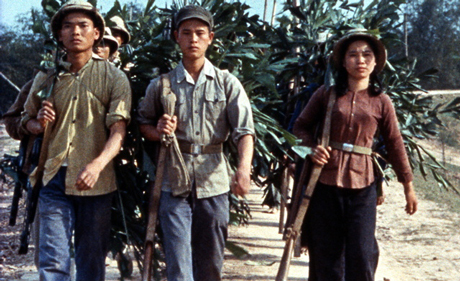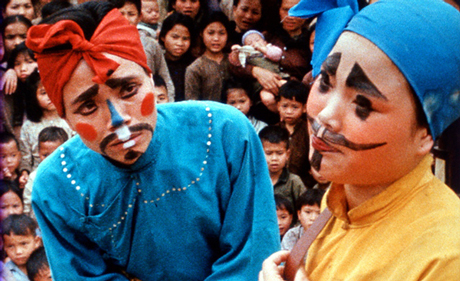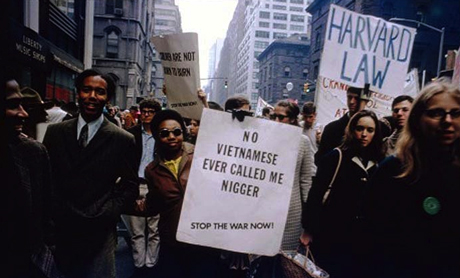|
|
Reviewed by Glenn Erickson
As the Vietnam War expanded into a major conflict in 1967, anti-war protest found new forms in America and Europe. Spearheaded by the respected intellectual filmmaker Chris Marker (Le Joli Mai, La jetée), a group of liberal French directors decided to go on record with a protest / advocacy documentary film to accuse the establishment that waged, supported and abetted the Vietnam War. Far from Vietnam is a fierce statement in defiance of the 'official story' reported by most mainstream media outlets. It was made in 1967, in advance of the biggest push of the anti-war movement in the United States.
Ten years later Peter Davis would premiere the impressive anti-Vietnam War documentary Hearts and Minds. It's a good film, but compared to Far from Vietnam it seems like crying over spilled milk, a chance for California liberals to proclaim their politics long after the damage has been done. The courageous makers of Far from Vietnam -- Chris Marker, Joris Ivens, William Klein, Claude Lelouch, Agnès Varda, Jean-Luc Godard and Alain Resnais -- spoke out during the heat of battle, when taking sides required real commitment.
When it was new Far from Vietnam mainly saw screenings at festivals and on college campuses, probably in so-so 16mm prints. Commercial bookings for anti-establishment pictures were difficult, due to vandalism and smoke bomb attacks by right-wing extremists. When they could, U.S. customs officials prohibited the import of 'foreign propaganda'. The situation wasn't all that different in France, where a theater showing Far from Vietnam was heavily damaged and its manager beaten by a mob of thugs. Almost fifty years later, we finally can see this important activist film in a fully restored version, a beautiful disc from Icarus Films.

Most of Far from Vietnam is great political filmmaking. It's not agitation propaganda, as seen in some Cuban films interposing ragged images of Ho Chi Minh with Mao-like text slogans. The polished patchwork of film was assembled from a variety of sources for one clear purpose: to cut through the official lies and show the public what the TV news wouldn't.
The French filmmakers either solicited ideal footage from the U.S. Armed Forces or were invited to film on ships, air bases and in Saigon, the gangster-ridden capitol of the puppet South Vietnamese regime. We see millions of dollars of armaments being unloaded, which the narrator uses as evidence that the technologically advanced America is attempting subjugate a poor nation halfway around the world. Filmmaker Joris Ivens went to North Vietnam during the fighting. His impressive footage includes a look at a shop fabricating concrete canisters that when sunk into sidewalks and covered with manhole covers, give Vietnamese citizens protection during B-52 raids. We see Vietnamese experts recovering hundreds of anti-personnel cluster bombs, little booby-traps dropped by the thousands with the express aim of maiming civilians. The ball-shaped bomblets would look like a toy to a child. Images of Viets digging out after a raid are reminiscent of film of the bombing of London in the Blitz. The looks of determination are the same. The French filmmakers also document a street theater performance, with cynical clowns dressed up as American leaders crying crocodile tears over the mass killings in Vietnam (next image below).
Far from Vietnam knows that Vietnam will eventually win the war. The aged Ho Chi Minh expresses this one sentiment on camera. Fresh color footage from Cuba shows Fidel Castro, a despot who nevertheless has served as the main international example of resistance to U.S. domination. Castro states that indigenous peoples defending their homelands can be exterminated, but never defeated. America will lose.
Other episodes take on different styles. Saber-rattling American speeches are intercut with comic strip panels of superheroes, an association that reminds us of co-director William Klein's acid satire Mr. Freedom. Much more compelling, even now, is a quiet interview sit-down in Paris with Vietnamese woman Ann Uyen and her guest Anne Morrison, an American Quaker. Ms. Morrison explains how her husband Norman Morrison, in solidarity with the Vietnamese people and taking the example of monks in Saigon, burned himself to death at the Pentagon in 1965. While we cringe at the thought of one of our loved ones doing this, the thoughtful and humble Anne talks about the suicide as an important and worthy act. She's no kook and has no agenda beyond the act itself. It's a damning blow against pundits that preach that anti-war activists are shallow opportunists. We see a statue of Morrison in Vietnam, where he is revered.

Far less effective are ill-conceived scripted passages in which the well-known French actor Bernard Fresson (French Connection II) performs with actress Karen Blanguernon, who simply stares at him in occasional cutaways. Playing "Claude Ridder", Bresson goes through a litany of liberal doubts about Vietnam, the colonial era, and the responsibilities of folk like himself who are well informed but feel powerless to alter history. After all, we are all "far from Vietnam", on the other side of the world. Later in the film a similar low point is reached when Jean-Luc Godard illustrates a rambling verbal discourse with dull shots of himself pretending to operate a large film camera. Godard's personal thoughts dance around the issue that he's a committed film director who doesn't know how to contribute to the pro-North Vietnamese cause. Hanoi turned down his travel request, which he later decided was a good thing. Godard eventually states that the best thing he can do is to lend his name to this movie. Although he seems sincere, his speech mostly reminds us of 'liberal' stars that want to publicly express their social commitment without interrupting their careers. Thus we get a few cartoonish outtakes from La Chinoise, with people in animal masks playing with guns.
One episode of Far from Vietnam covers the history of Vietnam from WW2 forward, in an extremely concise and focused twelve or thirteen minutes of film. It's not pretty, as it consists of one egregious lie and diplomatic outrage after another. The U.S. makes a bid for economic domination in Southeast Asia by filling the vacuum left by the departing French. An election to reunite the country was promised and then denied. General Westmoreland is seen on videotape addressing a banquet with a speech consisting entirely of hateful lies. As if vomiting video over Westmoreland's words, the TV image breaks up, incapable of playing back without retching.
The latter part of the film has terrific footage, the best I've seen, of early anti-War demonstrations, mostly in New York City. Some of the participants are marginal types, easily cherry-picked by the news to dismiss the participants as what The Silent Majority would call kooks and bums. Mayor Lindsay makes an appearance, smiles and says, "Aw, a parade is a parade." The rallies provide an opportunity for practically every advocacy group and alternative organization to parade in solidarity, while also touting their own fragmented agendas. American Nazis hand out flyers advocating that the Vietnamese be gassed wholesale. Student leaders proclaim that their University was apathetic until the police attacked small protests on campus and turned them all into activists. Young roughnecks from the Bronx and Brooklyn heckle from the sidelines until their throats give out: "Fags and Hags!" But the French filmmakers capture a number of great moments, as when some blacks (allied with the Panthers? I'm not sure) confront a Jewish guy hugging his child and chanting loudly against Napalm. The black guy doesn't know what Napalm is. The Jew explains, "jellied gasoline," and a meaningful discussion follows.
Far from Vietnam doesn't make dilettantish appeals to revolution, as do too many films from this era. It only wishes to document the fact that America has taken over the role of European aggression in the postwar, post-colonial era. Perhaps the strongest statement in the film is from "Claude Ridder", when he says that the French love Americans, the generous Yanks that liberated their country from the Nazis. But now, unfortunately, the Americans are the Nazis of the Vietnamese.

In the New York Times' 1967 review of Far from Vietnam Renata Adler objects to the film's editorial montage of pervasive advertising images. That idea would earn a Best Picture Oscar just two years later in John Schlesinger's Midnight Cowboy. She also dismisses the film for lacking polish (read - not looking American-made) and for not proposing a comprehensive solution for Vietnam. What's unclear about "Get the hell out?"
Once again Icarus Films is at the forefront of relevant documentary releases on disc. Their DVD of Far from Vietnam is a stunningly good restoration (2012) and transfer of this vintage political documentary, a gloves-off condemnation of the Vietnam War made soon after President Johnson's escalation. In all likelihood most of the film was shot in 16mm, but it all looks like 35mm in sharpness and color quality.
Also included is The Sixth Side of the Pentagon, a 25-minute film by Chris Marker and François Reichenbach, that documents a major demonstration at the Pentagon on Oct 21,1967. This guerilla film footage must have been an inspiration for Haskell Wexler's Medium Cool -- it's all happening and it's all real.
On a scale of Excellent, Good, Fair, and Poor,
Far from Vietnam rates:
Movie: Excellent
Video: Excellent
Sound: Excellent
Audio: English, French
Supplements: extra film The Sixth Side of the Pentagon by Chris Marker and François Reichenbach (1967)
Deaf and Hearing-impaired Friendly?
YES; Subtitles: English
Packaging: One DVD in keep case
Reviewed: December 10, 2013
Republished by permission of Turner Classic Movies.

DVD Savant Text © Copyright 2013 Glenn Erickson
See more exclusive reviews on the Savant Main Page.
Reviews on the Savant main site have additional credits information and are often updated and annotated with reader input and graphics.
T'was Ever Thus.
Return to Top of Page
|

